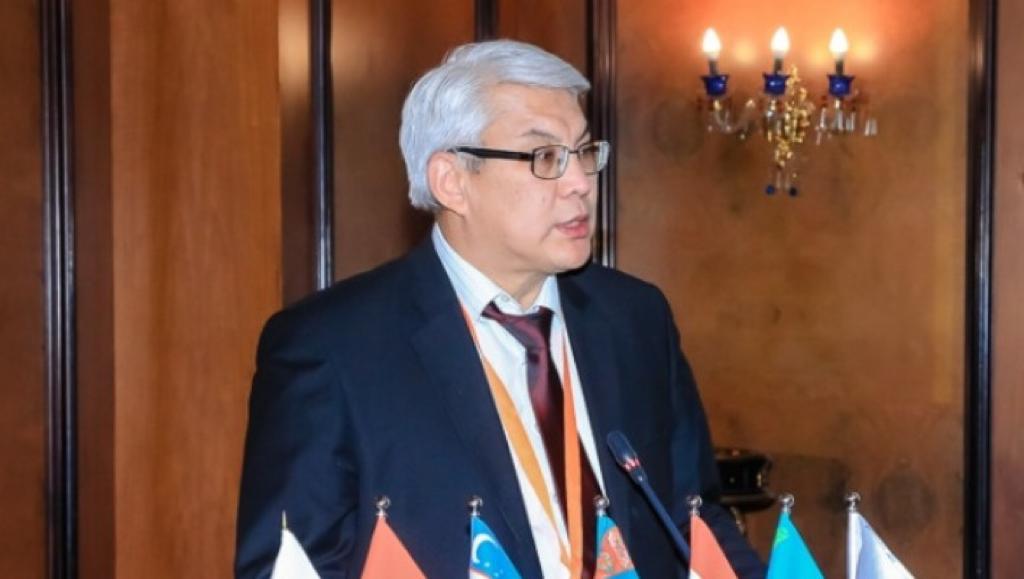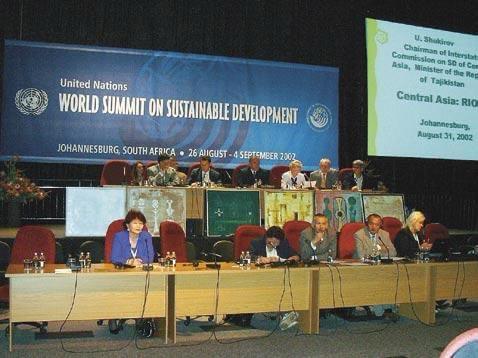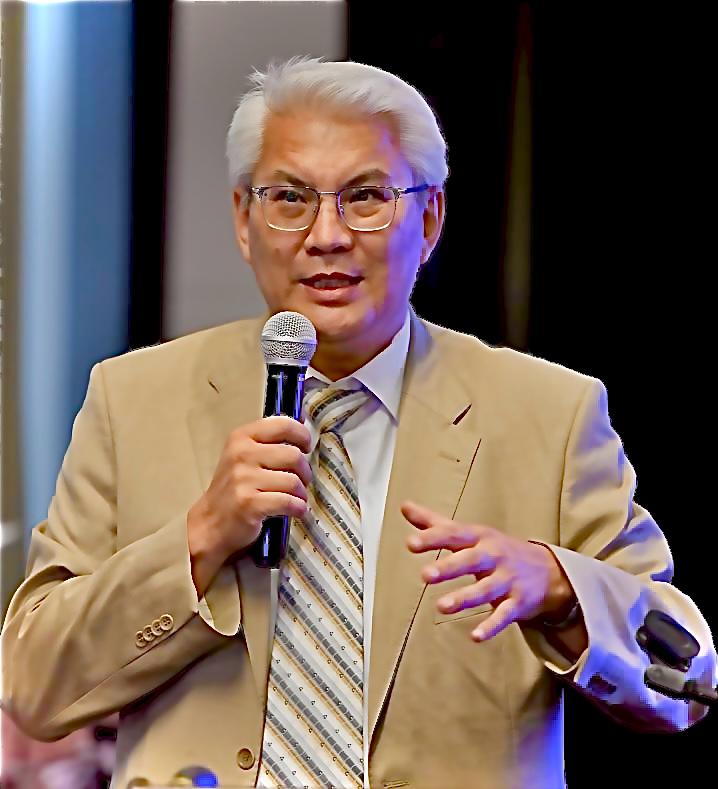Central Asia is highly vulnerable to the impact of climate change, threatening mountains, wildlife populations, habitats, and ecosystem services. Meet Mr Ysmail Dairov Director of the Regional Mountain Centre of Central Asia (RMCCA)
 His is a familiar face in the environmental meetings and conferences. Upon first encountering Mr Ysmail Dairov, one cannot but be impressed by this tall, stately man, an eminent environmentalist from Kyrgyzstan. Since the early 1990s he has been working on protecting the mountains and the unique climate of Central Asia. Devoted to his field, he is an expert with more than 200 articles to his credit.
His is a familiar face in the environmental meetings and conferences. Upon first encountering Mr Ysmail Dairov, one cannot but be impressed by this tall, stately man, an eminent environmentalist from Kyrgyzstan. Since the early 1990s he has been working on protecting the mountains and the unique climate of Central Asia. Devoted to his field, he is an expert with more than 200 articles to his credit.
We had a chance to meet him at the Third high-level international conference on the international decade for action “water for sustainable development”, 2018-2028, in June in Dushanbe, and we came away impressed.
Q: Could you tell us a little bit about yourself?
I studied biology in Russia from 1982 to 1987, and after finishing my studies, I started my career working in a nature preserve in Kyrgyzstan for two years. After that I moved to the central office of the Kyrgyzstan Environment Ministry.
 As you might know, Kyrgyzstan is a mountainous country. In the central office of the ministry where I worked for 12 years, I held different positions, first as a specialist, then as the head of the biodiversity department and then the head of the international cooperation department. When I was in this last post, I came many times to Geneva, where I participated in the sessions of the UNECE’s committee on environmental policy. Thus, I’m well acquainted with the mechanisms and procedures of the international organizations. I was also involved in the preparatory process of the two Ministerial Conferences in the framework of the “Environment for Europe” process, in 1998 at the Arhus, and in 2003 at the Kiev, participating as an expert from Kyrgyzstan and the Regional Environmental Centre for Central Asia in the conferences and making interventions.
As you might know, Kyrgyzstan is a mountainous country. In the central office of the ministry where I worked for 12 years, I held different positions, first as a specialist, then as the head of the biodiversity department and then the head of the international cooperation department. When I was in this last post, I came many times to Geneva, where I participated in the sessions of the UNECE’s committee on environmental policy. Thus, I’m well acquainted with the mechanisms and procedures of the international organizations. I was also involved in the preparatory process of the two Ministerial Conferences in the framework of the “Environment for Europe” process, in 1998 at the Arhus, and in 2003 at the Kiev, participating as an expert from Kyrgyzstan and the Regional Environmental Centre for Central Asia in the conferences and making interventions.
I also participated in the establishment of the regional environmental centre of Central Asia. When the centre was organised, I was offered in 2001 the position of manager of environmental policy programs and all regional ones. So, I moved to Almaty in Kazakhstan, where I was responsible for environment policy and cooperated closely with the environment ministers of the five Central Asian countries.
In 2008, I returned to Bishkek when the ministry invited me to take charge of the Central Asia regional mountain centre of the Interstate Commission of Sustainable Development (ICSD), which is also the structure of the International Fund for Saving the Aral Sea. I continued my involvement in the regional processes as a director of the Central Asia regional mountain centre until 2010, when Kyrgyzstan underwent a revolution. All our efforts and contacts were in vain.
In 2009, I was involved in the preparatory process on climate to the Copenhagen Summit. Before that, I had already in 2002 participated in the preparatory process to Johannesburg summit on sustainable development. I was involved with drafting many documents, and it was a great experience.
At that time, I initiated the Central Asian initiative on sustainable development that was reflected in the final documents of the Johannesburg summit where also organized the side-event on our initiative (photo is attached). In 2003 this initiative was also reflected in the fifth ministerial conference on environment for Europe, which took place in Kyiv. I also organized a regional conference for the environment and water ministers of Central Asia, and we adopted a document “Invitation to partnership” in which we reached out to all Central Asian countries and all donor communities for the practical realization of our Central Asian initiative on sustainable development. This document you can find at the list of the documents adopted by the Ministers in the Kyiv ministeririal conferece in 2003. Later, I also proposed to the Kazakhstan environment minister to organize in Astana the next ministerial meeting for Europe. So, in 2011 such a meeting took place.
 The Regional Mountain Center of Central Asia (RMCCA) was created by the Interstate Commission on Sustainable Development of Central Asia on the initiative of the minister of environment of Kyrgyzstan Mr.Davletkeldiev to ensure environmental protection and sustainable development of the mountain ecosystems in our region. It is responsible for the coordination and cooperation among Central Asian countries and the donor community/international organizations on mountain environmental issues, including climate disruption.
The Regional Mountain Center of Central Asia (RMCCA) was created by the Interstate Commission on Sustainable Development of Central Asia on the initiative of the minister of environment of Kyrgyzstan Mr.Davletkeldiev to ensure environmental protection and sustainable development of the mountain ecosystems in our region. It is responsible for the coordination and cooperation among Central Asian countries and the donor community/international organizations on mountain environmental issues, including climate disruption.
Q: Could you please tell us more about environmental diplomacy?
On my professional experience it’s a very specific and sensitive issue because it requires knowledge about environmental problems and the relations between countries. In addition, the subject is full of contradictions. Many diplomats don’t know about the content of environmental problems and have only general knowledge and imagination, and they make declarations such as “Oh, it’s very important to support…” etc. When I came back to Bishkek in 2008 to the position of director of the mountain region centre, I started to work on and was closely involved in the climate negotiation process. In 2009, there was a framework of the preparatory process to the Copenhagen COP 15. I also proposed the establishment of the coalition of a negotiation group consisting of the mountain landlocked development countries which includes Kyrgyzstan, Tajikistan and Armenia. Later Afghanistan joined our group. The problems of mountain countries are specific and are different from steppe countries and then madden countries for climate change. I started this work, but as mentioned earlier, the Kyrgyz revolution changed it all, and the new minister did not understand the issue and did not support my initiatives.
Q: So, what did you do?
I continued my work and tried to work on the regional level, because my position was adopted by five Central Asian ministers and my mandate was a regional one. To this I was invited as the director of the mountain centre. Now, I’m working but without official government support because a new specialist and new heads have been appointed, and they don’t understand the complexity and depth of our original problems.
I try to explain the issue to the new specialist, to the new heads at the ministry of foreign affairs and to the minister of environment, who replies, “Yes, that’s right, but we can’t draft a message to support regional cooperation in Kyrgyzstan.” This is why I spoke yesterday about the important potential in the Ashkhabad convention. It was drafted by UNEP lawyers in the beginning of 2000 in cooperation with some Central Asian countries’ authorities. Three countries signed this Ashkhabad convention, namely Tajikistan, Kyrgyzstan and Turkmenistan. Kazakhstan and Uzbekistan have not joined us yet. In the ICSD we have raised this question of why they underestimate the importance of this convention. When I analysed this convention, I found that there are many mechanisms and many procedures that already exist. The question is in the practical implementation. Many donors and many specialists from international organizations underestimate it and do not understand how we can benefit if we join this convention.
Q: Today, have you retired or do you still work full time?
I’m still the director of the regional mountain centre. It is a regional organization established under the international intergovernmental organization of Central Asia, IFASS. The main problem in our region is that the diplomats have a poor knowledge of international law.
I have many contacts with the diplomats for example within the Kyrgystan Ministry of Foreign Affairs, and I ask them why we haven’t joined the Helsinki Convention. The answer I get is that it does not correspond to our national interest. But what is our national interest? They say it’s so complicated. I raised the same question to international lawyers from another country in our region, and they don’t understand the specifics of environmental international law. So, it’s a big problem from my point of view. We need capacity building among the diplomats and lawyers. Of course they are oriented to the former Soviet approach.
Q: Does your organisation provide courses in international law?
I’m preparing the project proposal for Kyrgyzstan’s candidacy to Helsinki Convention, and within this project proposal I propose establishing a working group with the national experts from the Ministry of Foreign affairs, the Ministry of Energy and the Ministry of Justice: let’s start discussing the possibility of Kyrgyzstan joining the Helsinki Convention.
The problems of the Syr Darya River and the problems of the Amudarya River are in principle the same, and there are many aspects from my point of view for which we need a common discussion. That is why I proposed yesterday that we use the Ashgabat Convention and draft a separate protocol for the Syr Darya and Amudarya Rivers.
My first proposal was to our national authorities that we discuss the issues, and then send an invitation to international lawyers to conduct workshops and seminars and try to explain the provisions of the Helsinki Convention.
Q: Could you tell me a little bit more about your organization, the Regional Mountain of Central of Asia Mountain (RMCCA)?
In 2008 I was appointed director of the Regional Mountain Center of Central Asia, RMCCA, a position that I still hold. In 2017, the RMCCA produced a regional Outlook on Adaptation of Mountain Areas of Central Asia to Climate Change, which was drafted in cooperation with experts of Central Asian countries and the UNEP, a report you can find on the internet in English. Since December 2019, I have also been an adviser to the Kyrgyz Minister of Economy.
In 2020-2021 I was working as a consultant for the CAMP4ASB project “Promoting political dialogue and capacity building for Central Asian countries for the 26th Conference of the Parties to the United Nations Framework Convention on Climate Change (UNFCCC COP-26)”
I also work with them as a partner of another project on climate change and biodiversity, and then the 30-year anniversary of ICSD is coming up.
Q: How many people are working in your organization?
My organization is a project organization, so when I start a project I hire people. Right now, we are just three – myself, my accountant and an assistant.
If you would like to know more about the work they are doing, or to read some of his articles, they are available on the Internet. Upon this short note, and leaving Mr Dairov to his meetings, we can only wish him lots of success in all his endeavours.


